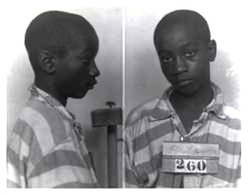 Mahmoud Asgari was just sixteen when the noose went over his head. He was being executed for a crime committed fourteen months previously.
Mahmoud Asgari was just sixteen when the noose went over his head. He was being executed for a crime committed fourteen months previously.
Beside him, Ayaz Marhoni had turned 18. They had acted together, been tried together and now they were going to die together.
It was a case which was causing controversy across the world. For a start, this hanging was contravening international law. Iran had signed the UN Convention on the Rights of the Child, which specifically prohibited juvenile executions.
(The USA and Somalia were unable to ratify their signatures for that very reason. Both nations reserved the right to sentence children to death.)
Nevertheless, on a sunny day in July 2005, a crowd had gathered in Edalat Square, in Mashbad, north-eastern Iran. They remained to watch the public hanging of two teenagers, who had each been given 228 lashes while waiting for their date with the gallows.
They were just two of an estimated 86 child executions, which have taken place worldwide since 1990, according to figures collected by Amnesty International. The vast majority of those died in Iran and the USA. The rest were in China, the Democratic Republic of Congo, Nigeria, Pakistan, Saudi Arabia, Sudan and Yemen.
The most recent was also in Iran. Delara Darabi was seventeen when her father's cousin was killed during a break-in. She initially confessed to the murder, believing that her youth would save her from execution.
When it became clear that it wouldn't, she changed her story. Her boyfriend had done it and then asked her to lie to protect him. She was in love. She did it.
The court didn't accept the new testimony and sentenced her to death anyway. Activists rallied to her cause, prompting Iran's Head of the Judiciary to cable a stay of execution. It was ignored by the governor of Rasht Central Prison. Delara was hanged during the morning of April 19th, 2009.
Until 2005, the USA led the world in child executions, though, in fairness, most of those were committed in the state of Texas. However, the case of Roper v Simmons (PDF) resulted in the death penalty being ruled unconstitutional for juveniles. The deciding factor was the fact that 30 states had previously opted to ban capital punishment for those under 18 years old at the time of the crime. This meant that there was now a 'national consensus' towards abolition.
China, Pakistan, Sudan and Yemen have also changed their laws within the past five years. Each country now requires defendants to have been over 18 at the time of the crime, before they can be sentenced to death.
This leaves just The Democratic Republic of Congo, Iran, Nigeria and Saudi Arabia allowing the practice. Nigeria is laboring under a self-imposed moratorium. This has resulted in 30 children since 1997 starting life sentences on Death Row without actually facing execution.


 Mahmoud Asgari was just sixteen when the noose went over his head. He was being executed for a crime committed fourteen months previously.
Mahmoud Asgari was just sixteen when the noose went over his head. He was being executed for a crime committed fourteen months previously.











 St Tydecho's Churches in West Waleson 09/03/2014
St Tydecho's Churches in West Waleson 09/03/2014
 Goodies for an Outlander Premiere Partyon 03/06/2015
Goodies for an Outlander Premiere Partyon 03/06/2015
 Holocaust Memorial Day Interview with Rainer Höss, Grandson of Rudolf Architect of Auschwitzon 01/24/2015
Holocaust Memorial Day Interview with Rainer Höss, Grandson of Rudolf Architect of Auschwitzon 01/24/2015
 Romantic Valentine Gifts for an Outlander Fanon 01/16/2015
Romantic Valentine Gifts for an Outlander Fanon 01/16/2015



Comments
No they haven't. There's only the USA and Somalia who didn't sign the Rights of the Child. The sticking point for the USA was the death penalty, but now that's on hold, there's really no barrier to the signing. Let's hope that they do it.
It's surprised me that the USA was killing kids until 2005. I didn't know that the country hadn't signed the Rights of the Child.
The sad truth is that it depends on the country. If you're a G8 country, then the entire of the UN can kick, scream and officially denounce their actions, but little else happens.
If you're a small nation that someone in the G8 hates, then all kinds of sanctions get imposed.
I didn't know that about child prostitution/trafficking. It certainly looks like a double standard to me.
What happens when a country is contravening a law they signed like that? Were there repercussions for the government from the UN?
As far as the death penalty, I don't support it for children or adults, but there is something about convicting a child as an adult in anyway. I know an argument is that they deserve it, because they were "making adult decisions," when they did something like murder, but I just don't agree with that.
This makes me think of children in the US who are being trafficked. Its interesting that according to US law it isn't prostitution, but automatically considered to be trafficking for any child under 18. Yet, children coerced onto the streets are often picked up and convicted on criminal charges. Instead of getting help, they are imprisoned.